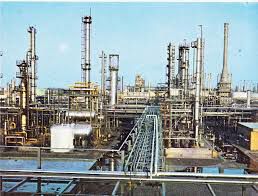1948: THE BRITISH LABOUR GOVERNMENT AND THE COMING OF THE ANGLO-IRANIAN OIL COMPANY’S CRISIS
The British Government expressed its sense of indignation in the following way:
It was British enterprise, skill and effort which discovered oil under the soil of Persia, which has got the oil out, which has built the refinery, which has developed markets for Persian oil in 30 or 40 countries, wharves, storage tanks and pumps, roads and rail tanks and other distribution facilities, and also an immense fleet of tankers. This was done at a time when there was no easy outlet for Persian oil in competition with the vast American oil industry.
None of these things would or could have been done by the Persian Government or the Persian people.31
The role of oil in Britain’s energy requirements was getting more vital year by year, as domestic and other coal supplied became even more expensive and inadequate in quantity.
The oil refinery at Abadan represented not only wealth but also that intangible in Britain’s presence in the Middle East, ‘prestige’. In the words of the British Resident in Kuwait, Francis Pelly, ‘Abadan stood for something… huge, a symbol which not even the most sceptical Arab could deny of British energy, British wealth, British efficiency and British industrial might.32
The oil refinery at Abadan was the largest in the world. Equally crucial, the nationalisation of the Anglo-Iranian Oil Company was also an embarrassment for the British Government due to the following reasons. There was, of course, the perceived centrality of the Persian Gulf, as Britain’s ‘life line’ in the Commonwealth strategic defence system. This was reaffirmed by the Chiefs of Staff Committee on 30th March 1951, which emphasised again the vital aspects of British defence considerations in the Persian Gulf in terms of the air and sea communication links in the area; the treaty of obligations Britain had towards Iraq, Jordan and other Arab states; the need to preserve North Africa from communism or Russian aggression; and the role of the Persian Gulf (air) bases as a springboard for offensive and strategic air action in the event of global war. This premise remained as unshakeable in the minds of the Foreign Office and the Ministry of Defence as it had been in 1945.33
The nationalisation of Iranian oil confronted the Labour Cabinet of 1951, headed by Clement Attlee, with a dilemma. They had themselves nationalised more industries than any previous government in British history, including the entire coal mining industry, which like Iranian oil, was then the country’s main source of energy, as was said before. In these circumstances they could hardly deny Iran’s right to nationalise. The Company, on the other hand, argued that the 1933 Concession was binding under international law and that the government must stand up firmly for British rights. Besides, the government owned half of the Anglo-Iranian Oil Company; the loss of its concession would be a major blow to the British economy. ‘Britain at the time still owned more overseas assets than any other country.’34 To acquiesce in a nationalisation would be to invite the seizure of more British assets by other nationalists.
‘The British Government would not tolerate a complete change in the Company’s position as provided for in the existing [i.e. the 1933] Agreement.’35 Lord Salisbury, in the House of Lords, ‘unwarranted interference in the Company’s affairs in Persia is deplorably weak.’36
- PRO, London, FO 371/91599, The General political correspondence of the Foreign Office, Sir Donald Fergusson, the Permanent Under Secretary of the Ministry of Fuel and Power, to Richard Stokes, who knew the region at first hand through his engineering firm, Ransome and Rapier, Top Secret, Private and Personal, 3rd October 1951.
- J.A. BILL and W.R. LOUIS, Musaddiq, Iranian nationalism and Oil, (London: I.B. Tauris and Co. Ltd., Publishers, 1988), pp. 229-230.
- J. CABLE, Intervention at Abadan: plan Buccaneer, (London: Macmillan, 1992), Chapters 5, 6, 7.
- B. LAPPING, End of Empire, (London: Paladin Grafton Books, 1989), p. 261.
- Parliamentary Debates, Commons, Vol. 487, Cols. 1006-1014, 1st May 1951 in H. ENAYAT, British Public Opinion and the Persian Oil Crisis from 1951 to 1954, M.Sc. Econ. Thesis, University of London, 1958, p. 110.
- Parliamentary Debates, Lords, Vol. 172, Col. 681, 5th July 1951, in ibid, p. 103.



